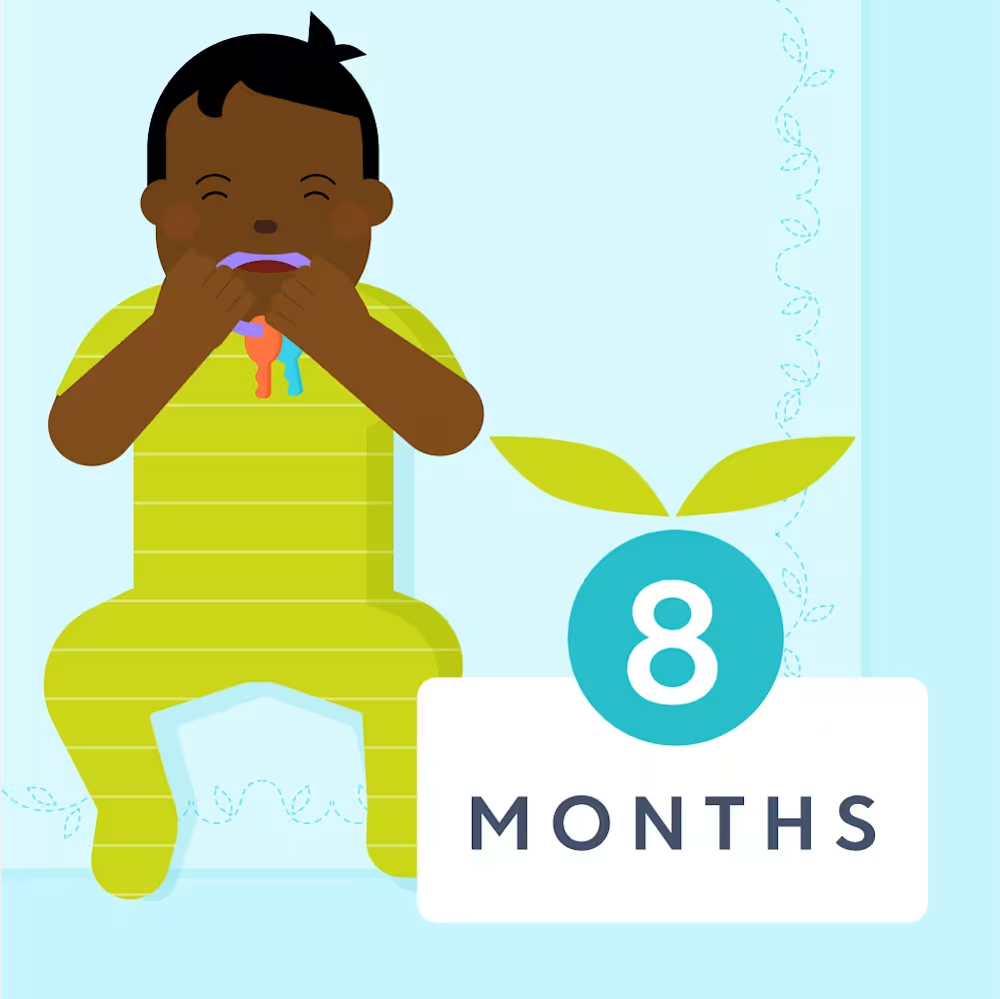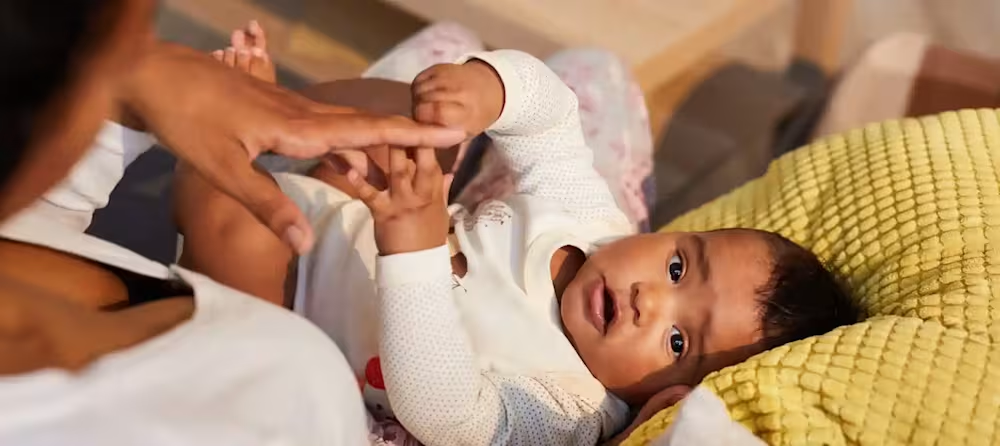6 month sleep regression: myth or real?
Updated Dec 16, 2025

When your baby’s sleep patterns suddenly change, it can leave you wondering if it’s something temporary to wait out or whether you should take action to help things get back on track. We’re here to get you through it!
In this article, we’ll help you figure out if your baby is going through a “6 month sleep regression” and also give you tips for navigating sleep challenges.
Is there a 6 month old sleep regression?
can vary and they may occur at any age. If your baby is suddenly not sleeping or starts having new challenges (like fighting sleep, increased waking, shorter naps, etc.) at 6 months, we would call this a sleep regression.
Why do 6 month old babies have sleep issues?
There are a variety of factors that may lead to poor sleep at around 6 months, including:
Sleep onset associations
Overtiredness
Circadian and sleep pressure misalignment
Hunger
Discomfort
Mastering milestones
We'll explain more about these factors below:
(1) Sleep onset associations
Infants who are rocked, fed, or otherwise helped to sleep by their parents tend to wake up during the night more. Since they receive help at bedtime, they’re more likely to call out for help [] when they wake between sleep cycles at night. The same goes for day sleep: parental help often leads to shorter naps.
(2) Circadian and sleep pressure misalignment
Around 6 months, babies may experience sleep issues when their maturing circadian rhythm (internal clock) becomes more influential but isn’t aligned with their homeostatic sleep pressure (the buildup of sleep need). If naps are mistimed — too short, too long, or too frequent — it can throw off the balance, leading to overtiredness or under-tiredness at sleep times. This misalignment can result in difficulty falling asleep, frequent night wakings, early waking or short naps.
(3) Hunger
Many babies this age will sleep better overnight with 1 - 2 feedings. Infants who regularly eat more than that during the night may continue to eat less during the day because they’re not as hungry. This can create a cycle where your baby will continue to make up the intake during the night.
Keep in mind that many babies go through a growth spurt [] at this age. You may notice an increase in appetite for 2 - 3 days, which can lead to some new hunger-related wakings.
(4) Discomfort
Babies who are sick, teething, or otherwise in discomfort tend to wake more at night. If your baby wakes mid-sleep cycle during the night (meaning that they wake sooner than 40 - 50 minutes after falling asleep), this can be a sign that they’re uncomfortable or in pain.
(5) Mastering milestones
Babies are often doing so many new and exciting things at this age! When they’re working on a new motor skill — like rolling, sitting up, or — sleep is often impacted. Your baby may get “stuck” in an uncomfortable position in their crib or simply prefer to practice their new moves at night. Either way, it can take a few weeks for your baby to adjust to their new mobility. Practicing these fun new skills is much more fun than sleeping, after all!
Signs of 6 month sleep issues and regressions
If your infant is experiencing new sleep challenges, you may notice any number of the following, which are commonly referred to as “6 month sleep regression signs”:
Increased night waking: Around 25 - 50% of babies [] continue to wake overnight at 6 months. However, if your child suddenly begins waking more frequently than usual overnight, we could consider this a sleep regression.
Trouble falling asleep: If your 6 month old has started fighting sleep for naps and/or at bedtime, some would call this a sleep regression. Note that a schedule adjustment may help.
Waking very early in the morning: It’s not uncommon for infants to wake earlier than normal during a period of poor sleep.
Short or skipped naps: Little ones may have trouble falling asleep and staying asleep during the day during a period of challenging sleep.
My 6 month old won’t nap so is this a sleep regression?
Infants can experience 6 month “nap regressions” too. However, if your 6 month old is fighting naps or has at this age, it may be because they need a schedule adjustment. You can view our sample.
If you’re already following an age-appropriate nap schedule, consider how your baby is falling asleep too. Babies who fall asleep independently at nap time are more likely to link their sleep cycles without assistance, leading to longer naps. Instead of waking up after one sleep cycle and calling out for you, they’ll dose off again and get in that nice long nap.
How long do 6 month sleep problems last?
You may be wondering how long it’ll feel like your 6 month old is not sleeping. While sleep regressions don’t have definitive lengths, a return to your child’s typical sleep patterns depends on the contributing factors (teething, separation anxiety, etc.) and whether new sleep onset associations were created during this time, i.e. offering lots of extra assistance falling asleep.
For example, if a child’s sleep is thrown off because they’re excited about a new skill — like learning to roll — it might interfere with sleep for a couple of weeks but usually settles down once the novelty wears off. But if their sleep is rough because they rely on something specific to fall asleep, chances are it won’t get better without changing that routine.
6 tips to handle 6 month old sleep issues and regressions
Find more details below:
Tip #1: Follow an age-appropriate sleep schedule
Taking too many naps (or too few) in a day can cause or exacerbate sleep challenges. It can be a tricky balance! Often 3 naps are the sweet spot for babies this age. Typically we see that the first two naps are at least an hour long, while the third nap is a shorter 30 - 45 minute power nap.
Tip #2: Aim for wake windows that are 2 - 3 hours long
Rule out schedule-related sleep issues by ensuring that your baby’s wake windows are age-appropriate. Most babies this age can comfortably stay awake for about 2 hours before their first nap, and about 2.5 - 3 hours before bedtime. When wake windows are too short, this can reinforce short naps and lead to shortened night sleep. On the other hand, wake windows that are too long can also lead to undesired outcomes. Overtired babies tend to have a harder time falling asleep, wake more at night, and often wake too early in the morning. Maintaining age-appropriate wake windows isn't a magical sleep regression solution, but it can help ensure that timing isn’t adding to already bumpy sleep.
Tip #3: Focus on independent sleeping skills
By 6 months old, most babies are physiologically able to fall asleep without being rocked, held, or otherwise helped to sleep []. Once a of falling asleep without parental assistance, they’ll be more likely to link sleep cycles both day and night. That means longer naps and longer stretches of nighttime sleep.
Tip #4: Ensure the sleep space is dark, cool, and quiet
To get your little one to start sleeping better, prep your baby’s bedroom with black-out curtains, lower temps, and white noise []. A really dark room can help ensure that the morning sun doesn’t set your baby’s internal clock to wake too early. It can also help lengthen naps by cutting out visual distractions.
Target a room temperature of 68 - 72F (20 - 22C), which is optimal for babies and adults. Invest in a machine to muffle household and neighborhood sounds that may interfere with your baby’s snooze.
Tip #5: Set a regular wake-up time
If you're looking to improve the quantity and quality of sleep, aim for a consistent morning rise time. This will help you find the best sleep times for your baby and can lead to more predictable sleep patterns. Not only does this help regulate your baby’s schedule, but it can also cut down on sleep issues like split nights (that’s when a baby stays awake for long periods during the night).
Ideally, your baby will wake within the same 30-minute window each morning. Yes, that means weekends too! If you’re in a 2-parent household, consider trading off so you each have a weekend day to sleep in.
Tip #6: Give your baby opportunities to practice motor skills
If your baby is mastering a milestone like sitting up [], chances are it will temporarily impact sleep a bit, no matter what you do. You can, however, help deal with a 6 month sleep regression and cut down on milestone-related sleep issues by giving your baby plenty of time and space to practice new motor skills during the day. Incorporating tummy time to work on rolling, or using floor time to work on independent sitting, can help your baby master the motor skill faster and make it a bit less exciting to work on their skills at sleep times.
How much sleep does a 6 month old need?
We recommend aiming for around 14 hours of total sleep daily at. This usually looks like 11 - 12 hours at night and 2.5 - 3.5 hours during the day over 3 naps. Remember, when it comes to baby sleep, there's a range of normal — some babies need more or less sleep than this. We recommend paying attention to your child’s mood and energy levels when determining if they’re getting the shuteye they need.
How do I know if it's teething or a 6 month sleep regression?
Sometimes it's hard to tell what’s going on with your little one, especially at this age. If you are wondering if your baby is , here are a few telltale symptoms to watch for []:
Chewing on objects or hands
Drooling
Gum pain
Rash on the face
Teething is common at 6 months. However, if you notice any red flags when it comes to your baby around new chompers or otherwise, check in with their doctor.
How can I tell if it's separation anxiety or 6 month sleep problems?
Many factors can contribute to sleep challenges, including — so it’s not quite that it's sleep problems OR separation anxiety. Around 6 months, babies have likely formed a preference for their primary caregivers and may be weary of new faces. These early signs of separation anxiety can lead to behaviors like fussing when you leave the room or showing a clear preference for familiar people.
These new emotional milestones can sometimes affect sleep. Your baby may resist bedtime, wake more often overnight for comfort, or take short naps. At the same time, other factors like teething, developmental milestones, and changing nap needs can add to the mix.
Since there’s rarely a single factor to pinpoint when it comes to poor sleep at this age, focus on offering comfort and consistency. Stick to predictable routines, reassure your baby when needed, and remember — this phase is a normal part of their development.
Can you sleep train during a sleep regression?
Most babies are developmentally ready for sleep training at and older, even if they’re going through a period of challenging sleep. There are a you can implement to help your baby learn to fall asleep independently. Some techniques are more gradual than others and are designed to limit tears as much as possible. Other strategies prioritize speed and may allow for more crying in the short term. Sleep training is a personal choice and only you can decide what’s right for your family and situation.
Can I let my 6 month old cry it out during a sleep regression?
By around 6 months of age, many babies are developmentally ready to begin sleep training, though the ideal approach depends on your family's goals and comfort level. Gentle methods (like gradual withdrawal or pick-up-put-down) can work well at this stage and support your baby in learning to fall asleep more independently.
More intensive techniques, such as total extinction (also known as “” with no check-ins), are often chosen by parents who want a fast method and find that check-ins for calming are actually more upsetting than leaving the baby alone. You can use this method if your baby is going through a sleep regression, however, it’s important to ensure your little one’s needs are met first (i.e. they are fed, dry, and not in physical discomfort). Use a video monitor and perform regular safety checks, ideally once per hour, to ensure their well-being.
Before beginning any sleep training, consider your baby’s overall health and development and consult your pediatrician if you have any concerns.
What are self-care tips for tired parents?
Connect with other parents: Joining a local or virtual parent group can be an outlet for sharing experiences (the good, bad, and the exhausting!) and reminding yourself you’re not alone.
Get moving: Take a walk with the stroller, stretch your body during tummy time, or pop on a YouTube workout for 10 minutes to help release tension and give you an energy boost. You don’t need a long, intense workout to get those endorphins flowing.
Ask for (and accept) help: Even though you’re not in the throes of the newborn stage anymore, being a parent is hard work! Whether it’s a partner, friend, or relative, let someone take over a feeding or chore so you can have a moment to yourself.
Should I let my baby sleep in my bed during a regression?
The American Academy of Pediatrics strongly discourages bed-sharing due to safety concerns []. If you bring your little one into bed for a feeding or some comforting cuddles, they recommend returning them to a firm, flat sleep surface before you fall asleep. It’s especially crucial to avoid sleeping with your baby on couches or recliners, where the risk of infant injury or death is significantly higher []. While many parents do end up bed-sharing at some point, understanding the risks can help families make informed, safety-focused decisions.When to talk to a doctor
Sleep challenges are a frustrating yet normal part of infant sleep development. However, you know your child best. If you have any concerns about their sleep patterns, are concerned that they aren’t getting enough sleep, or notice any red flags in general, we recommend consulting with their healthcare provider.
When to talk to a doctor
Sleep challenges are a frustrating yet normal part of infant sleep development. However, you know your child best. If you have any concerns about their sleep patterns, are concerned that they aren’t getting enough sleep, or notice any red flags in general, we recommend consulting with their healthcare provider. Here are some additional examples of when it may be time to talk to their doctor:
Feeding or weight gain concerns: If your baby is regularly skipping feeds, having fewer wet diapers, or not gaining weight as expected, it’s a good idea to contact their doctor. If you're breastfeeding, a lactation consultant can also offer valuable support.
Excessive fussiness or signs of pain: If your baby seems unusually fussy, can’t be soothed, or appears to be in pain, there may be an underlying issue — such as reflux, an ear infection, or another illness — that needs attention.
Unusual symptoms: While illness can lead to a temporary sleep regression, symptoms like fever, rash, vomiting, or a persistent cough may need medical attention.
Too much sleep: If your baby is sleeping much more than usual, seems unusually drowsy, or is difficult to wake up, it’s worth checking in with their pediatrician.
Your instincts: You know your baby better than anyone. If something doesn’t seem right, trust your gut and reach out for guidance.
Takeaway
A “sleep regression” is when a baby who was sleeping well suddenly starts having new sleep issues. At 6 months, factors like developmental milestones, teething, and schedule issues may contributeg to patches of rocky sleep.
Teaching your baby to fall asleep independently can improve sleep at this age. There are a variety of sleep training approaches, ranging from gentler methods that take more time to quicker strategies that may involve more crying upfront.
Remember that sleep regressions are temporary and a normal part of your baby’s development. With the right strategies, you can help your baby navigate these changes and improve their sleep over time.
If you're curious about what lies ahead with sleep regressions, glimpse into the future to see what you might experience once your baby is .
Share article:
Note: The content on this site is for informational purposes only and should not replace medical advice from your doctor, pediatrician, or medical professional. If you have questions or concerns, you should contact a medical professional.
9 Sources
Share article:






